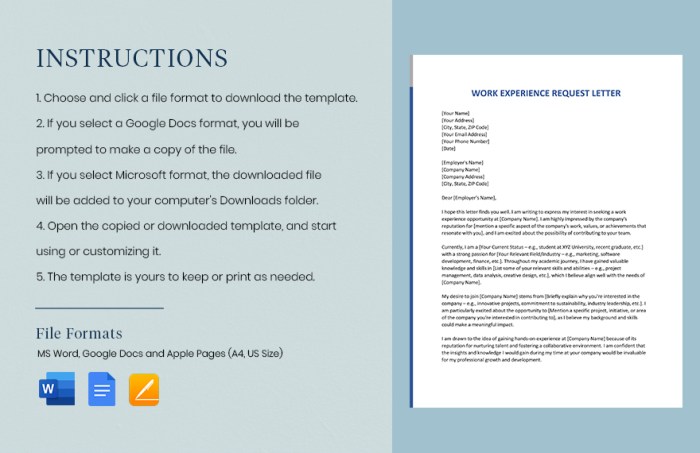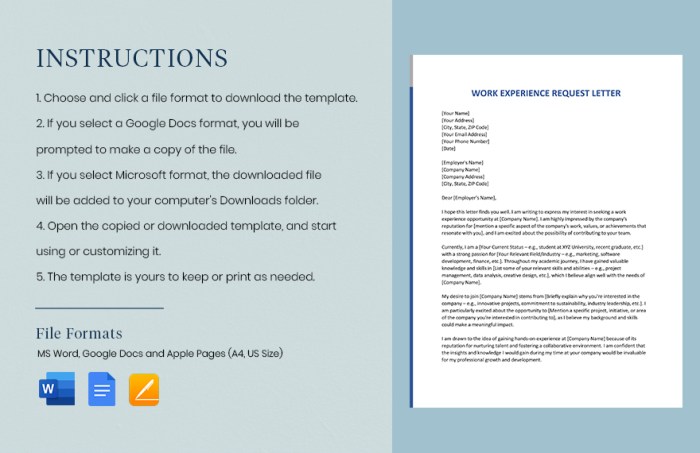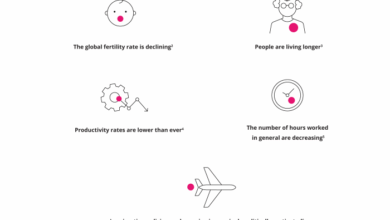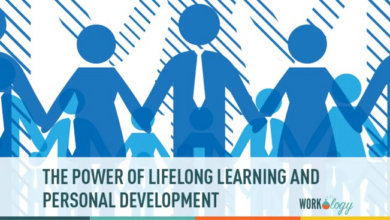
How to ask employers for work experience is a crucial skill for career advancement. This guide provides a comprehensive approach to proactively seeking internships, volunteer opportunities, or part-time roles. It delves into the benefits of gaining real-world experience, highlighting how it boosts your resume and career trajectory.
From crafting compelling emails to navigating potential rejections, this guide covers every stage of the process. We’ll explore essential research, tailoring your requests, and maintaining professionalism throughout your interactions with potential employers. Learning how to ask employers for work experience is more than just a formality; it’s an investment in your future.
Introduction to Seeking Work Experience: How To Ask Employers For Work Experience
Proactively seeking work experience is crucial for career development. It provides valuable skills, knowledge, and connections that can significantly enhance your future job prospects. Beyond simply gaining experience, it allows you to explore potential career paths, refine your interests, and discover your strengths and weaknesses in a real-world setting. This early exposure often leads to a deeper understanding of the industry and better preparation for future employment opportunities.Different types of work experience opportunities, from internships to volunteering and part-time jobs, offer unique benefits and contribute to a well-rounded skill set.
Each provides a platform to build your resume and demonstrate your abilities, ultimately shaping your future career path.
Types of Work Experience Opportunities
Gaining work experience comes in various forms, each with its own advantages. Internships, volunteer positions, and part-time jobs are key examples of how to gain real-world experience. Internships often offer structured learning and mentorship, while volunteering allows you to contribute to a cause you care about, gaining valuable soft skills. Part-time jobs provide practical experience in a professional setting, allowing you to apply classroom knowledge to real-world scenarios.
Benefits of Gaining Work Experience
Work experience provides significant advantages in your career development. It enhances your resume, showcasing tangible skills and accomplishments. This practical experience builds your confidence and demonstrates your ability to handle responsibilities, fostering professional growth. Moreover, it allows you to build valuable professional connections, leading to potential future opportunities. Gaining practical knowledge through real-world application solidifies your theoretical understanding and improves your overall job preparedness.
Comparison of Work Experience Options
The table below compares internships, volunteering, and part-time jobs, highlighting their key differences and benefits.
| Feature | Internship | Volunteering | Part-Time Job |
|---|---|---|---|
| Nature of Work | Structured, often industry-specific tasks with mentorship | Contribution to a cause or organization, often with a focus on community service | General work tasks, potentially in various sectors |
| Skill Development | Strong in technical and industry-specific skills, developing soft skills like teamwork | Strong in interpersonal skills, time management, and commitment | Develops a range of skills, including problem-solving and time management, often in a specific field |
| Career Advancement | Directly related to future career aspirations, often leading to job offers | Demonstrates commitment and passion, beneficial for roles requiring compassion or teamwork | Demonstrates work ethic and reliability, can lead to future full-time employment opportunities |
| Compensation | Usually stipend or salary | Usually no monetary compensation | Usually monetary compensation |
Preparing for the Request
Before you reach out to potential employers, thorough research and careful preparation are crucial for a successful work experience application. Knowing the landscape of available opportunities and tailoring your approach to specific companies significantly increases your chances of securing a valuable experience. This section delves into the essential steps for successful preparation.
Researching Potential Employers
Thorough research is paramount before contacting any employer. Understanding the company’s values, mission, and recent projects provides context for your request. This allows you to demonstrate genuine interest and align your aspirations with their objectives. Research also helps you identify relevant departments and specific individuals who might be involved in work experience programs.
Landing a work experience role can be tricky, but approaching employers with a well-structured request can significantly increase your chances. Highlight your relevant skills and interests, demonstrating how your experience aligns with their needs. For instance, understanding the complexities of tech industry acquisitions like those involving James Gosling and Oracle, as explored in this insightful article james gosling vs oracle acquisitions open source and reality , can show employers you’re deeply engaged with industry trends.
Ultimately, showcasing your initiative and eagerness to learn will make your application stand out.
Identifying Suitable Employers
Identifying suitable employers involves recognizing companies that align with your career goals and offer work experience opportunities. Consider companies in your desired industry, those known for strong mentorship programs, and those whose values resonate with you. A combination of online searches, networking, and attending career fairs can yield valuable leads.
Examples of Companies Offering Work Experience
Numerous companies offer work experience programs. Some examples include tech giants like Google and Microsoft, which often have structured internships and shadowing opportunities. Financial institutions like Goldman Sachs and JPMorgan Chase frequently provide similar programs. Furthermore, many smaller startups and non-profit organizations also offer work experience to students and recent graduates. These opportunities can vary significantly in terms of duration, scope, and the specific skillsets they target.
Tailoring Your Request
Tailoring your request to specific employers demonstrates your initiative and a genuine interest in their organization. Highlight relevant skills or experiences that align with the company’s needs. Research their recent projects and initiatives to show that you’ve considered their work and understand their goals. This shows that you’ve taken the time to understand their mission and the type of work they do.
Questions to Ask Potential Employers, How to ask employers for work experience
Asking thoughtful questions demonstrates your interest and helps you gauge the suitability of the work experience opportunity. These questions can help you determine if the experience aligns with your career goals and if the employer can offer the mentorship and support you seek.
- What types of projects or tasks are typical for work experience participants?
- Who would be my primary supervisor and mentor during the experience?
- What opportunities for skill development are available within the program?
- What are the company’s expectations for work experience participants?
- What is the typical duration of work experience placements?
- How does the work experience program support networking opportunities?
Professional Email Template
A professional email is crucial for conveying your request effectively. The following template provides a framework for crafting a personalized message to potential employers.
Subject: Work Experience Inquiry – [Your Name]
[Company Name]
Dear [Hiring Manager Name],I am writing to express my keen interest in pursuing a work experience opportunity at [Company Name]. I am a [Your Year] at [Your University] studying [Your Major].[ Briefly explain your interest in the company and the specific area of work you are interested in. Mention specific projects or initiatives that appeal to you. ]I am confident that my skills in [List 2-3 key skills] and my experience in [Mention relevant experience] would be a valuable asset to your team.I have attached my resume for your review.
Could you please advise on the process for applying for work experience opportunities at [Company Name]?Thank you for your time and consideration.Sincerely,[Your Name][Your Phone Number][Your Email Address][Your LinkedIn Profile URL (optional)]
Crafting a Compelling Request
Asking for work experience isn’t about begging; it’s about strategically showcasing your value to potential employers. A well-crafted email demonstrates your initiative, enthusiasm, and alignment with the company’s needs. This section will guide you through crafting an email that effectively communicates your interest and positions you as a valuable asset.A strong request email focuses on demonstrating your suitability for the role and the value you can bring.
It’s more than just asking; it’s a proactive step in building a professional relationship and showcasing your potential.
Key Elements of a Strong Request Email
A compelling request email should clearly Artikel your objectives and demonstrate your understanding of the company and the role. It should be concise, professional, and focused on the mutual benefit of both parties. The email should highlight your relevant skills and experiences, emphasizing how they align with the company’s needs.
- Clear Subject Line: A concise and descriptive subject line immediately grabs the recipient’s attention and clearly indicates the email’s purpose. Avoid generic subjects like “Work Experience Request.” Instead, try “Seeking Internship Opportunity at [Company Name]” or “Interested in Volunteering at [Company Name].”
- Professional Salutation: Address the recipient by name, if possible. A simple “Dear [Name],” is appropriate and professional. Avoid overly familiar or casual salutations.
- Introduction and Background: Briefly introduce yourself and your background, referencing your relevant academic or professional experiences. Clearly state your interest in gaining work experience and how it aligns with your career goals. This should be brief and engaging, making it easy for the recipient to grasp your motivation.
Highlighting Relevant Skills and Experiences
Demonstrating your skills and experience is crucial. Emphasize how your past experiences have equipped you with the skills the employer values.
Asking employers for work experience can be tricky, but a clear and concise approach is key. Highlight your relevant skills and enthusiasm, emphasizing your eagerness to learn and contribute. Keep in mind that, due to the pandemic, many internships are now more likely to be unpaid and require in-person attendance, as seen in this article about pandemic internships more likely to be unpaid and face to face.
Therefore, be prepared for different structures and expectations when reaching out to potential employers. This research will help you navigate the current landscape and tailor your approach accordingly.
- Specific Examples: Instead of general statements, use specific examples from your past projects, extracurricular activities, or volunteer work to illustrate your skills. Quantify your contributions whenever possible.
- Alignment with the Role: Carefully research the role’s requirements and highlight how your skills and experiences directly match those requirements. Connect the dots between your accomplishments and the company’s needs.
- s: Use s relevant to the job description. This helps your email get noticed by applicant tracking systems (ATS) and allows the recipient to easily identify your qualifications.
Demonstrating Enthusiasm and Interest
Show genuine interest in the company and the role.
- Research: Demonstrate your understanding of the company’s mission, values, and recent projects. This shows you’ve put in the effort to learn about the organization.
- Specific Interest: Clearly state your interest in the particular aspects of the role or the company that resonate with you. This makes you a more engaged and focused candidate.
- Professional Tone: Maintain a professional and enthusiastic tone throughout the email. Avoid sounding desperate or overly demanding.
Quantifying Achievements and Contributions
Quantifying your achievements and contributions strengthens your case.
- Metrics: Use numbers and metrics to showcase your accomplishments. For example, instead of saying “Managed a project,” say “Managed a project with a 20% increase in efficiency.” Quantifiable results speak volumes.
- Results-Oriented Language: Use action verbs and quantifiable results to describe your contributions. For instance, “Improved customer satisfaction by 15%,” or “Increased sales by 10%.”
- Examples: Illustrate your achievements with specific, measurable examples. This provides concrete evidence of your abilities.
Addressing Potential Concerns about Experience Level
Addressing concerns about your experience level is important.
- Focus on Transferable Skills: Highlight transferable skills you’ve developed through your experiences, even if they don’t directly match the job description. These skills are often just as important as specific technical skills.
- Highlight Relevant Skills: Focus on how your existing skills and experiences are relevant to the specific role and how you can quickly learn the necessary skills. Highlighting your eagerness to learn and adapt shows initiative.
- Emphasis on Eagerness to Learn: Express your eagerness to learn and contribute, emphasizing your willingness to grow and develop within the company. This shows your long-term commitment.
Expressing Gratitude and Professionalism
Professionalism and gratitude are essential in all communication.
- Closing: Conclude with a professional closing, such as “Sincerely,” or “Thank you for your time and consideration.” Express gratitude for their time and consideration.
- Proofreading: Thoroughly proofread your email for any errors in grammar, spelling, or punctuation. A professional email demonstrates attention to detail.
- Contact Information: Include your contact information (phone number and/or LinkedIn profile) at the end of the email, enabling quick follow-up and communication.
Email Writing Styles Comparison
| Email Style | Description | Pros | Cons |
|---|---|---|---|
| Formal | Uses standard business language, avoids slang or overly casual phrasing. | Professional, avoids misinterpretations. | Can sound stiff or impersonal. |
| Semi-Formal | Balanced approach, uses a slightly more conversational tone while maintaining professionalism. | More engaging than formal, easier to connect with the recipient. | Might not be suitable for all situations. |
| Informal | Uses casual language and tone, often employed for internal communication or when building relationships. | Engaging and friendly. | Less suitable for seeking work experience; may appear unprofessional. |
Handling Employer Responses
Navigating employer responses to your work experience requests can be tricky. Knowing how to interpret different reactions and how to effectively follow up is crucial. This phase isn’t about simply asking; it’s about demonstrating your initiative, understanding, and professionalism. A thoughtful approach can significantly increase your chances of securing valuable experience.Understanding the spectrum of responses, from enthusiastic acceptance to polite rejection, and knowing how to respond to each is essential.
Proactive follow-up and a willingness to learn from feedback are key components in this stage.
Common Employer Responses
Employers often have various reasons for responding to your work experience request. Some responses might not be straightforward, requiring careful consideration and interpretation. Understanding these responses can help you tailor your approach and future requests.
- Positive Responses: A clear “yes” is a welcome outcome. These responses often Artikel the next steps, such as scheduling an interview or discussing the specific role.
- Neutral Responses: A response that expresses interest but doesn’t immediately commit to an offer can mean the employer is still considering your request. This often involves more investigation, perhaps to assess your suitability against their current needs or available positions. These responses might suggest additional information or steps to clarify your qualifications.
- Negative Responses: A “no” can be disappointing, but it’s important to understand the underlying reasons. Often, a specific reason for rejection is provided. This feedback can be valuable for future endeavors.
- Delayed Responses: Sometimes, an employer may take time to respond. This doesn’t necessarily mean they’re uninterested. Consider your request’s complexity and the employer’s workload. A polite follow-up email can be appropriate after a reasonable timeframe.
Strategies for Following Up
Following up on your initial request is crucial. It demonstrates your persistence and genuine interest. Timing and approach are essential for effective follow-up.
- Timing is Key: Don’t bombard the employer with emails. Allow a reasonable timeframe—a week or two—before sending a follow-up. If no response is received, a follow-up is appropriate. Be mindful of the employer’s busy schedule.
- Keep it Concise and Professional: Your follow-up email should be brief and reiterate your interest in the opportunity. Avoid repeating information already included in the initial request. A simple reminder of your interest and the desired work experience is sufficient.
- Addressing Concerns Directly (if applicable): If you have a follow-up email that’s prompted by a specific request or concern raised by the employer, address it promptly. This demonstrates your engagement and proactive approach.
Examples of Appropriate Follow-Up Emails
Crafting effective follow-up emails is vital. Here are a few examples:
- Example 1 (Neutral Response): “Subject: Following Up on Work Experience Inquiry – [Your Name]”
“Dear [Employer Name],
I hope this email finds you well.
I’m following up on my previous email regarding work experience opportunities. I’m eager to learn more about potential possibilities and how I might contribute to your team.
Thank you for your time and consideration.” - Example 2 (Delayed Response): “Subject: Checking In – Work Experience Inquiry”
“Dear [Employer Name],
I’m writing to check in regarding my previous email of [Date] regarding work experience. I’m still very interested in the opportunity and available to discuss further.
Thank you for your time and consideration.”
Handling Rejection Gracefully
Rejection is a part of the process. Handling it professionally and constructively is essential. Learning from rejections can significantly improve your future approaches.
- Accept the Feedback: If a rejection includes specific feedback, acknowledge and consider it seriously. This is valuable insight for refining your approach and enhancing your skills.
- Reframe the Rejection: Rejection doesn’t mean you’re not qualified. It might simply mean the opportunity wasn’t suitable at this time. Reframe it as a learning opportunity for future applications.
- Learn and Adapt: Identify any weaknesses or areas where you can improve. Consider your skill set, tailor your approach, and seek additional experience in relevant areas.
Turning Rejections into Learning Opportunities
Rejections are stepping stones, not roadblocks. Turning them into learning opportunities can significantly enhance your future prospects.
- Analyze the Rejection: Identify specific reasons for rejection. Did the employer cite a lack of experience, a mismatch in skills, or another factor? Thorough analysis will help you understand the reasons behind the rejection.
- Refine Your Approach: Based on the feedback, refine your approach to future applications. Address any identified weaknesses and highlight relevant skills and experiences.
- Seek Mentorship: Consider seeking advice from mentors or career advisors. Their insights can provide valuable guidance in improving your application strategy and career advancement.
Building Your Network for Opportunities

Networking is crucial for securing work experience. It’s not just about collecting business cards; it’s about building genuine connections that can lead to valuable opportunities. By actively engaging with professionals in your field, you increase your visibility and your chances of discovering internships, part-time roles, or even full-time positions.Developing a strong professional network requires strategic effort and consistent engagement.
This involves understanding how to connect with people, leverage online platforms, and attend events that align with your career goals. A well-maintained network can open doors to hidden opportunities and provide invaluable mentorship.
Significance of Networking
Building a network goes beyond simply gathering contacts. It provides access to insights, advice, and potential opportunities that might not be readily available through traditional means. Networking fosters a sense of community, allowing you to learn from the experiences of others and gain a deeper understanding of your chosen field. This shared knowledge and support can be invaluable in navigating the complexities of the job market.
Strategies for Connecting with Professionals
Effective networking involves more than just superficial interactions. Focus on building genuine connections by demonstrating genuine interest in others’ work and experiences. Actively listen, ask thoughtful questions, and offer assistance when possible. Remember to follow up after meetings and maintain contact through regular communication. This could involve sharing articles, attending industry events, or simply checking in via email.
So, you’re looking for work experience? A great way to approach employers is by showing initiative and highlighting your skills. Sometimes, it’s as simple as reaching out and asking if there are any volunteer opportunities or shadowing options. Plus, in today’s digital landscape, understanding how to keep older systems running, like maintaining XP in a Windows 7 world, how to keep xp running in a windows 7 world , can demonstrate valuable problem-solving abilities.
Ultimately, the key is to show your eagerness and your willingness to learn and contribute.
Remember to tailor your approach to each individual and maintain professional etiquette throughout.
Leveraging Online Platforms for Networking
Online platforms offer a powerful tool for expanding your professional network. LinkedIn is a primary example, allowing you to connect with professionals in your field, join relevant groups, and engage in discussions. Other platforms, such as Twitter, can be used to follow industry leaders and participate in relevant conversations. Actively participate in online forums and groups related to your interests to expand your network and showcase your expertise.
Examples of Networking Events and Opportunities
Industry conferences, workshops, and seminars provide excellent opportunities to meet professionals and expand your network. Attending local meetups or industry-specific events can lead to valuable connections. Look for career fairs and networking events hosted by universities or professional organizations. These gatherings offer structured opportunities to interact with potential employers and mentors.
Online Resources for Finding Work Experience Opportunities
Numerous online resources can assist in your search for work experience. Websites like Indeed, LinkedIn, and company career pages often post internship or entry-level positions. Explore online job boards tailored to specific industries or fields of study. Professional organizations frequently offer internships or other work experience opportunities through their networks.
Networking Approaches: Pros and Cons
| Networking Approach | Pros | Cons |
|---|---|---|
| In-person events (conferences, workshops) | Direct interaction, face-to-face connections, potential for mentorship, building rapport | Can be time-consuming, requires travel, potentially overwhelming |
| Online platforms (LinkedIn, Twitter) | Wider reach, cost-effective, convenient scheduling, global connections | Potential for impersonal interactions, requires active engagement to be effective, difficulty in assessing genuine interest |
| Informational interviews | Targeted learning, gaining insights from professionals, exploring specific career paths | Requires proactive scheduling and preparation, potential for rejection |
| Professional organizations | Industry-specific knowledge, access to job opportunities, building a network within your field | Potential for limited opportunities depending on the organization |
Maintaining Professionalism Throughout the Process
Your quest for work experience hinges on more than just the request itself. A polished and professional demeanor throughout the entire interaction significantly impacts your chances of success. A positive and respectful approach builds rapport, making you a more memorable and appealing candidate.Maintaining a professional image is crucial from initial contact to follow-up communication. This involves meticulous attention to detail, appropriate communication, and a consistent, enthusiastic attitude.
Remember, every interaction is an opportunity to showcase your professionalism and leave a lasting positive impression.
Importance of Professional Communication
Effective communication is paramount in the professional world. This extends to all aspects of seeking work experience, including emails, phone calls, and even brief interactions. Professional communication involves using proper grammar, avoiding slang or overly casual language, and maintaining a respectful tone. Clear and concise language ensures your message is easily understood, reducing misunderstandings.
Examples of Appropriate Communication and Etiquette
Using professional email etiquette is critical. Subject lines should be clear and concise, outlining the purpose of the email. Body paragraphs should be well-organized, with proper formatting and grammar. Formal language is essential, and avoid using overly casual or informal language.
- Email Subject Lines: “Inquiry about Internship Opportunities,” “Request for Information – [Your Name],” “Follow-up on [Date] Application.” These examples illustrate clarity and purpose.
- Phone Etiquette: Be prepared, have a concise message ready, and avoid using slang or colloquialisms. Be polite and respectful to the recipient’s time. If leaving a voicemail, leave a clear and professional message with your name and contact information.
- In-Person Interactions: Maintain eye contact, offer a firm handshake, and use polite language. Dress professionally and maintain good posture to project confidence and professionalism.
Maintaining a Positive and Enthusiastic Attitude
A positive and enthusiastic attitude is contagious and can make a significant difference in how you’re perceived. Your enthusiasm for the opportunity should be evident in your communication, whether written or spoken. Show genuine interest in the company and the role, and highlight your relevant skills and experience.
Respecting Employer Time and Resources
Employers’ time is valuable. Be mindful of this and keep your requests concise and focused. Avoid lengthy emails or phone calls that don’t contribute to the desired outcome. Provide only the necessary information to support your request. Researching the company and the role demonstrates your initiative and respect for their time.
Strategies for Handling Potential Conflicts or Challenges
Conflicts may arise, perhaps due to a delayed response or a misunderstanding. Approach these challenges with professionalism and a calm demeanor. Reiterate your interest while remaining respectful of the employer’s time. Consider alternative approaches or strategies to overcome any obstacles. Be prepared to adapt your approach based on the situation.
Importance of Timely Responses and Follow-ups
Proactive communication is key. Respond to inquiries promptly and follow up on your requests in a timely manner. A well-timed follow-up email or phone call can demonstrate your persistence and commitment to the opportunity.
Adapting Strategies for Specific Industries

Seeking work experience is a crucial step in your career journey. However, understanding the nuances of different industries is vital for crafting a compelling request. A generic approach often falls flat, and tailoring your strategy to the specific industry demonstrates your genuine interest and understanding of the field.Different industries have varying expectations for work experience. A company in the tech sector might prioritize practical skills and demonstrable problem-solving abilities, while a non-profit organization might emphasize volunteer experience and community engagement.
By adapting your approach, you can significantly increase your chances of securing a valuable opportunity.
Key Differences in Work Experience Expectations Across Industries
Understanding the unique expectations within different industries is crucial for crafting an effective work experience request. The healthcare industry, for example, often emphasizes teamwork and patient care, while the finance industry may prioritize analytical skills and financial literacy.
Tailoring Your Approach to Different Industries
Tailoring your approach is key to demonstrating your understanding of the industry. Research the company’s work, identify their values, and match your interests to their needs. Highlight any relevant coursework, projects, or extracurricular activities that align with the industry’s requirements. Show initiative by demonstrating familiarity with industry-specific jargon and current trends. For example, if applying to a tech company, mentioning recent technological advancements or specific software used in the industry can be very effective.
Examples of Work Experience Requests Appropriate for Different Sectors
- Technology: “I am eager to gain practical experience in software development. My coursework in [specific course] has provided me with a strong foundation in [relevant skills]. I am particularly interested in [specific area within tech] and believe my skills in [relevant skill] would be valuable to your team.”
- Healthcare: “I am a highly motivated student seeking work experience in a healthcare setting to further develop my understanding of patient care. My volunteer experience at [organization] has exposed me to [relevant tasks] and fostered my desire to contribute to a positive patient experience.”
- Non-profit: “I am enthusiastic about the mission of [non-profit]. My interest in [specific area of work] stems from my involvement in [relevant extracurriculars/volunteering]. I am eager to contribute my skills in [specific skill] to your team.”
Understanding Industry-Specific Terminology
Demonstrating your understanding of industry-specific jargon is a clear indicator of your genuine interest. Actively researching and familiarizing yourself with common terms used in different sectors will showcase your commitment to understanding the field.
Strategies for Demonstrating Understanding of the Industry
- Research: Thoroughly research the company and the industry. Understand their mission, values, recent projects, and target audience. Look for any recent news or trends in the industry and tailor your request to reflect this understanding.
- Networking: Connect with professionals in the industry. Attend industry events, webinars, or conferences to learn about current trends and build connections. Networking can provide valuable insights and recommendations.
- Demonstrate Knowledge: Show your understanding of industry challenges and opportunities. This can be done by asking insightful questions during your initial communication with the employer.
Table Summarizing Industry-Specific Requirements for Work Experience
This table provides a concise overview of the common expectations for work experience across different industries.
| Industry | Key Skills/Experiences | Examples of Work Experience Requests |
|---|---|---|
| Technology | Programming, problem-solving, teamwork, analytical skills | “I am interested in gaining practical experience in software development.” |
| Healthcare | Patient care, teamwork, communication, empathy | “I am eager to gain experience in a medical setting to develop my understanding of patient care.” |
| Finance | Financial analysis, data interpretation, communication, attention to detail | “I am interested in gaining experience in financial analysis to develop my skills in financial modeling.” |
| Non-profit | Community engagement, teamwork, fundraising, problem-solving | “I am eager to contribute my skills to a non-profit organization.” |
Outcome Summary
In conclusion, securing work experience requires meticulous preparation and a proactive approach. By following the steps Artikeld in this guide, you can effectively communicate your interest, highlight your skills, and increase your chances of securing valuable experience. Remember, building your network and maintaining professionalism throughout the process are equally vital components of success. Ultimately, this guide equips you with the knowledge and strategies to make the most of opportunities and take your career to the next level.






